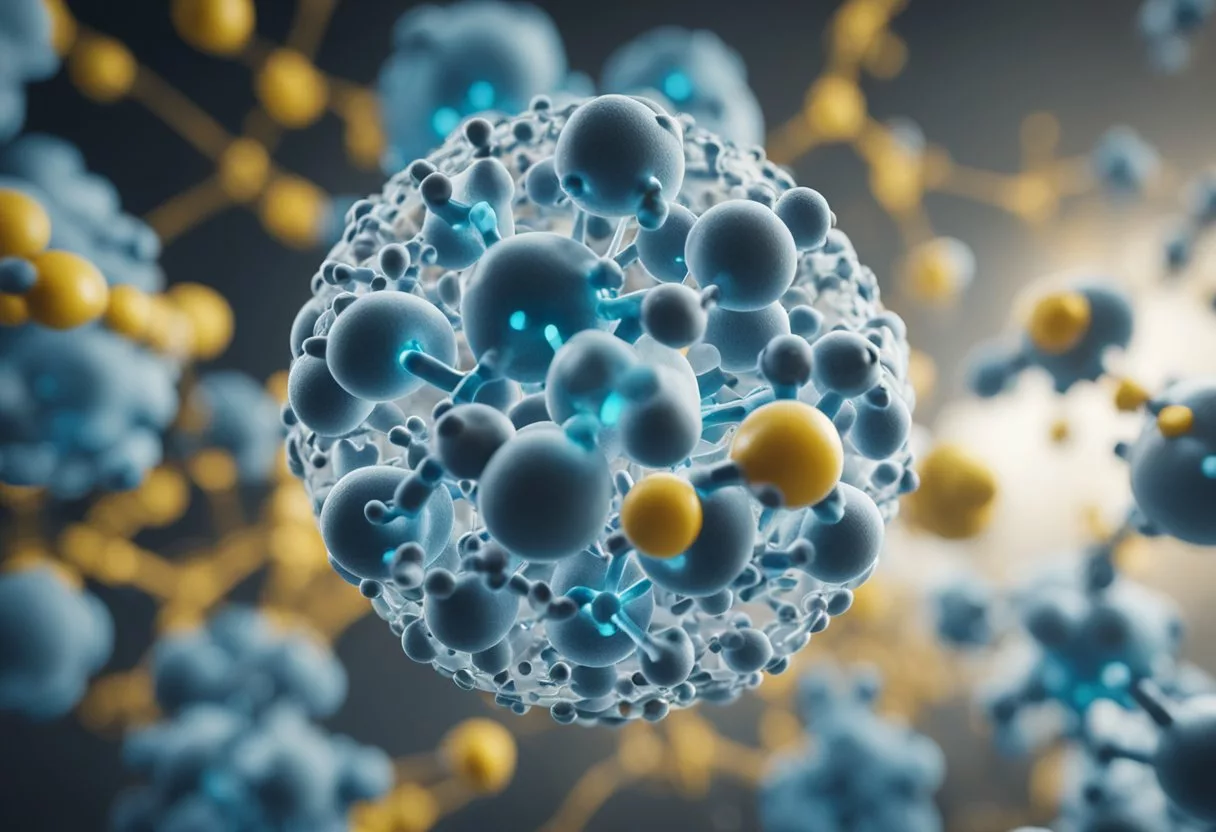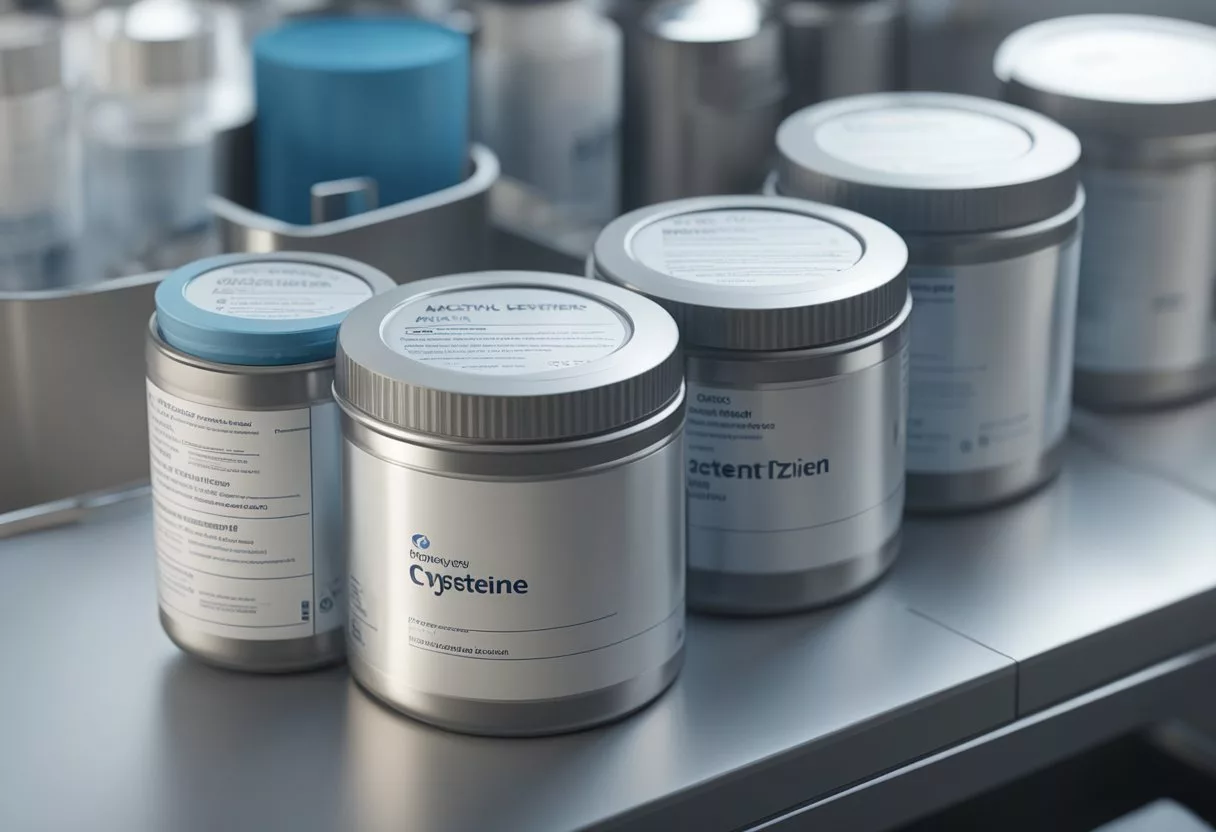Acetyl cysteine, also known as N-acetyl cysteine or NAC, is a modified form of the amino acid cysteine. It is noteworthy for its role as a precursor to glutathione, an essential antioxidant that protects against cellular damage from free radicals and toxins.
This makes acetyl cysteine a significant contributor to the body's natural defense mechanisms against oxidative stress.
Beyond its antioxidant properties, NAC exhibits an ability to replenish intracellular levels of glutathione, assisting in detoxification processes and maintaining cellular health.
It holds a place of importance in medical therapy, particularly as an antidote for acetaminophen (paracetamol) toxicity, which can lead to liver failure if unaddressed.
Its versatility extends into other therapeutic applications, attributed to its capacity to act as a mucolytic agent, breaking down mucus in cases of respiratory conditions.
Key Takeaways
- N-acetyl cysteine is a derivative of cysteine and a precursor to the antioxidant glutathione.
- It serves therapeutic purposes, especially in treating acetaminophen toxicity.
- NAC has a mucolytic effect, aiding in the treatment of respiratory conditions.
Chemical Properties and Biological Role

N-acetyl cysteine (NAC) stands out for its diverse roles in human health, primarily due to its chemical makeup which allows it to engage in critical biological processes. Being a derivative of the amino acid cysteine, it plays a crucial function in antioxidant production and serves as a precursor to glutathione, the body's most powerful antioxidant.
Role in Antioxidant Production
N-acetyl cysteine is known to contribute to antioxidant protection by directly scavenging free radicals. It achieves this by providing a source of thiol groups that react with reactive oxygen species (ROS), often neutralizing these damaging compounds before they can harm cells.
By countering oxidative stress, NAC supports the body's defense against the potential damage inflicted by ROS.
As a Precursor to Glutathione
A vital aspect of N-acetyl cysteine is its role as a building block for glutathione, a tripeptide consisting of amino acids cysteine, glycine, and glutamine.
Glutathione is essential in cellular defense mechanisms due to its reactivity to ROS. NAC serves as a direct precursor to cysteine, which in limitated conditions can become the rate-limiting substrate for glutathione synthesis, thereby bolstering antioxidant capacity and cellular health.
Medical and Therapeutic Applications

Acetylcysteine, commonly known as N-acetylcysteine (NAC), holds a significant role in medical treatment with applications ranging from liver protection to managing respiratory conditions and supporting mental health.
Liver Protection and Detoxification
N-acetylcysteine is a first-line treatment in cases of acetaminophen overdose. It acts by restoring glutathione levels in the liver, which are depleted during an overdose.
This helps prevent liver damage and supports the liver's detoxification pathways.
Clinical evidence suggests NAC's administration is almost 100% effective if given within 8 hours post-ingestion, highlighting its critical role in attenuating potential harm to the liver.
Respiratory Conditions Management
N-acetylcysteine has mucolytic properties, making it beneficial for patients with respiratory conditions such as chronic obstructive pulmonary disease (COPD), asthma, bronchitis, and cystic fibrosis.
It aids in thinning and loosening mucus in the airways, thereby facilitating easier breathing and alleviating symptoms.
The efficacy of NAC in improving lung function can be attributed to its capability to decrease inflammation and disrupt viscous mucus secretions.
Support in Psychiatric Disorders
The role of N-acetylcysteine in mental health, particularly for disorders like schizophrenia, bipolar disorder, depression, and obsessive-compulsive disorder (OCD), is of growing interest.
Its potential benefits are thought to arise from its ability to modulate glutamate levels in the brain and replenish antioxidant defenses.
This can result in improvements in symptoms experienced by patients suffering from these psychiatric conditions, although further research is necessary to fully elucidate its therapeutic impact.
Clinical Use and Dosage

N-Acetyl cysteine (NAC), a supplement with medicinal qualities, plays a critical role in numerous clinical applications. Its usage spans from antioxidant supplementation to its pivotal role as an antidote for acetaminophen toxicity.
Recommended Dosage and Administration
The standard supplemental dosage of NAC ranges between 600 to 1200 mg daily.
As a medication, it is utilized in much higher quantities, especially in the context of acetaminophen overdose, where the FDA-approved protocol entails a loading dose followed by several maintenance doses.
Clinical usefulness of NAC outlines the specific regimen for such medical emergencies, starting with an initial dose of 140 mg/kg followed by a series of 70 mg/kg doses administered over the course of 24 hours.
Common Side Effects and Interactions
While NAC is generally well-tolerated, some individuals may experience side effects such as nausea, vomiting, and diarrhea.
When taken orally, it can also cause a dry mouth.
It is important to be aware of potential interactions with other medications and to discuss these with a healthcare provider.
Information on side effects and safety suggests caution when using NAC due to its expansive impact, especially when combined with nitroglycerin and may enhance the vasodilatory effects.
Safety Profile and Considerations
N-Acetylcysteine (NAC), a supplement with a well-established safety profile, is generally considered safe. However, like any medication or supplement, NAC may have potential side effects and certain populations should take additional precautions.
Understanding Potential Side Effects
NAC may cause various side effects, some of which may be dose-dependent. Common side effects include nausea, vomiting, and diarrhea.
In rare instances, it may trigger an allergic reaction with symptoms such as rash, itching, or difficulty breathing. Use of NAC has been linked to a lower incidence of liver damage when used as an antidote for acetaminophen overdose.
High doses can potentially lead to bleeding disorders or impact kidney function.
The safety of NAC at higher doses has been explored in patients with chronic respiratory diseases, indicating an increase in adverse side effects with elevated doses.
Those considering NAC supplementation should be aware of its potential side effects, particularly if prone to such health issues.
Precautions for Special Populations
Pregnant or breastfeeding women should use NAC under medical supervision, as there is insufficient data on its safety for these populations.
Those with a history of bleeding disorders, liver problems, or kidney disease should consult a healthcare provider before starting a regimen that includes NAC.
Consumption of NAC in conjunction with alcohol may influence the effectiveness of the supplement and can exacerbate liver damage.
Additionally, there is limited research on the effects of NAC on infertility, and individuals should seek medical advice when considering it for this use.
Frequently Asked Questions

This section addresses some of the most common inquiries about N-acetyl cysteine (NAC), ranging from its benefits to optimal usage guidelines.
What are the recognized benefits of taking N-acetyl cysteine supplements?
N-acetyl cysteine is known for its ability to support antioxidant defenses in the body by promoting the synthesis of glutathione, a potent antioxidant.
It also helps improve respiratory function by thinning mucus.
What common side effects might one experience with N-acetyl cysteine?
While N-acetyl cysteine is generally well-tolerated, some individuals may experience side effects such as nausea, vomiting, or headache. For those with asthma, there may be a risk of bronchospasm.
What is the recommended dosage for N-acetyl cysteine supplements?
The recommended dosage for N-acetyl cysteine varies depending on the specific health condition it is being used for.
Dosages can range from 600 to 1800 mg per day, divided into multiple doses.
Can taking N-acetyl cysteine be potentially dangerous?
Taking N-acetyl cysteine may present risks for individuals with certain health conditions or those taking medications that could interact negatively.
It is critical to consult a medical professional before starting NAC, especially for individuals with a pre-existing medical condition.
How should N-acetyl cysteine be timed for optimal effect, morning or evening?
The timing for taking N-acetyl cysteine may be linked to personal preference and the intended health benefit.
Some individuals might find it more effective in the morning, while others may benefit from taking it in the evening.
In what ways does cysteine contribute to physiological health?
Cysteine plays a crucial role in supporting physiological health.
It is a precursor to glutathione, which protects cells from oxidative stress. Cysteine is also involved in critical metabolic processes in the body.